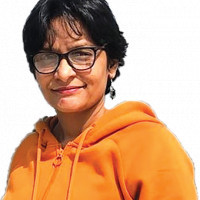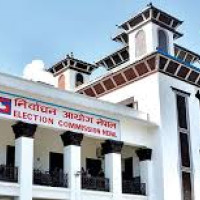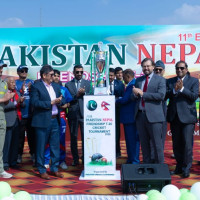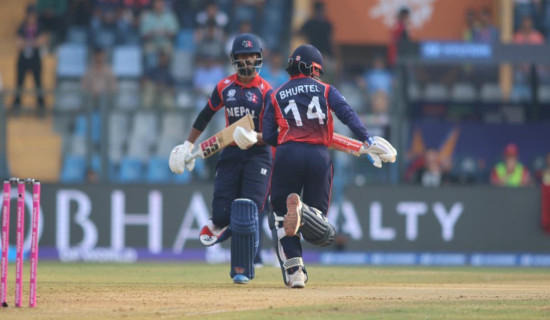- Monday, 9 February 2026
Temperature rise affects food security, water resources in Mugu
Mugu, Oct. 29: Birkha Bahadur Rokaya lost his toes to frostbite in 1988 when heavy snowfall was common in winter. However, with changing climate patterns and reduced snowfall, the region remains mostly dry during winter.
Rokaya, a conservation activist and a village shaman from Rosi Rural Municipality in Mugu district, recalled a time when villagers would worship the gods during droughts, a tradition that has since faded. “People planted trees like pine, which do not absorb much water, and replaced trees that thrived in wetter lands,” he shared.
Now, various diseases infect crops and insects previously unseen in the area have become common. Villagers rarely get the chance to cultivate healthy crops anymore. “We know temperatures are rising and climate change is impacting us significantly. In Karnali, one of the country’s most underdeveloped regions, we face the harshest consequences,” Rokaya said.
Bhagbati Giri, Vice-Chairperson of Patarasi Rural Municipality in Jumla, said that women and children are facing particularly tough challenges due to the shifting climate. “Women are the ones working in the fields. They gather firewood, care for their families and collect water. The changing climate and irregular rainfall are disrupting their daily routines, making their lives even harder,” she explained.
In recent years, women have had to cope with newly arrived pests in the fields. “We do not use chemical fertilisers or pesticides on our crops, but these new insects cause significant damage. Also, the rising temperatures and irregular snowfall and rainfall are disrupting the traditional cultivation calendar,” she said.
Bishnu Kumar Bham, Chairperson of Chhayanath Rara Rural Municipality in Mugu, shared that this year, the district experienced snowfall on October 19, 2024, an unusually early time for such weather. “We are struggling with these unpredictable weather patterns. Rain and snowfall pattern has changed,” he said.
Gauri Kala Budha, Vice-Chairperson of Tila Rural Municipality in Jumla, said that the monkey menace has also increased in the district, making it difficult to harvest crops.
“Traditionally, we plant paddy in the last week of June or the first week of July, but with shifting climate patterns, we barely have a chance to cultivate it by the end of July,” she said, adding that water sources are drying up, with previous sources no longer available.
Now, many settlements are at higher elevations than the remaining water resources. As a result, around 100 families have migrated elsewhere. “We are also seeing an increase in malnutrition among children,” she added.
Around 150 people, including the rural municipality chairpersons and ward chairpersons of all local bodies from 10 districts of Karnali Province, climate change activists, government officials, relevant authorities and conservationists, gathered near Rara Lake last week to discuss the impacts and consequences of climate change in Karnali Province.
Experts have highlighted that communities in Karnali are facing intensified hardships due to climate change, particularly affecting livelihoods, food security and access to clean water. To address these issues and elevate local concerns to the global stage, the Ministry of Forest and Environment and Sathsathai, organised a conclave titled “Bridging Karnali and the Globe: Roadmap to COP 29.”
Minister for Forest and Environment Ain Bahadur Shahi Thakuri, who is from Mugu district, was also present at the discussion. Responding to local concerns, Minister Thakuri said, “We are here to discuss these problems and find solutions. We will bring these local issues to international forums. As COP 29 approaches, we will present Karnali’s challenges at the climate summit and work towards long-term solutions and it will be easy for us to claim the climate fund.”
“Karnali is at the forefront of climate change impacts, with Mugu being the most affected of the 10 districts in the province. The district suffers heavy losses due to landslides and floods. This discussion will help demonstrate the need for funding to address climate change impacts,” he said.
The Karnali Conclave also issued a five-point Karnali Declaration, focused on preparations for COP 29 and addressing both the impacts and opportunities of climate change in Karnali Province. The declaration stressed that Nepal, particularly Karnali, faces high climate risks and has limited capacity to cope with the challenges climate change brings. Minister Thakuri said that the Karnali Declaration will be presented at COP 29.
Chairperson of Sathsathai, Prajeeta Karki, explained that the programme aimed to bridge the gap between Karnali and the global stage. “We know Karnali is underdeveloped and severely affected by climate change, but now we are bringing its issues to an international forum so that the province would not continue to face these problems in the future,” Karki said.

















